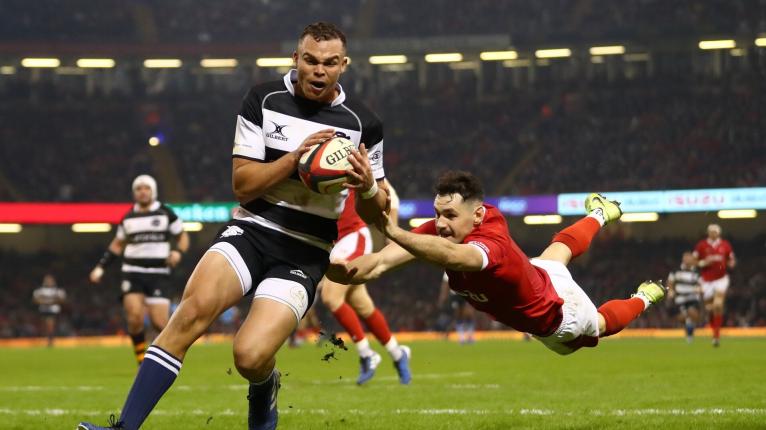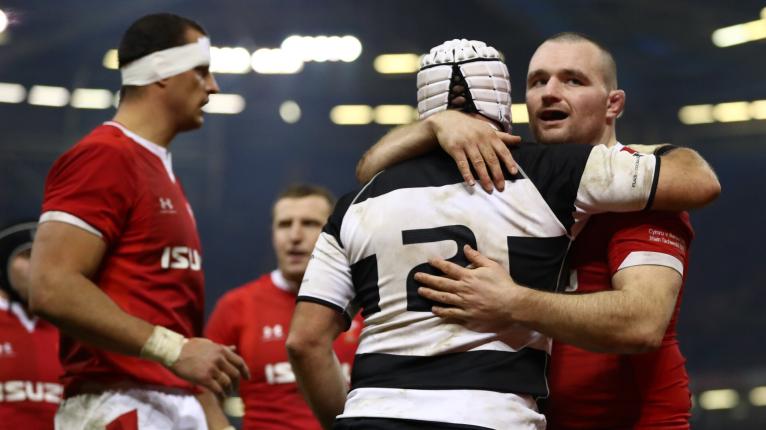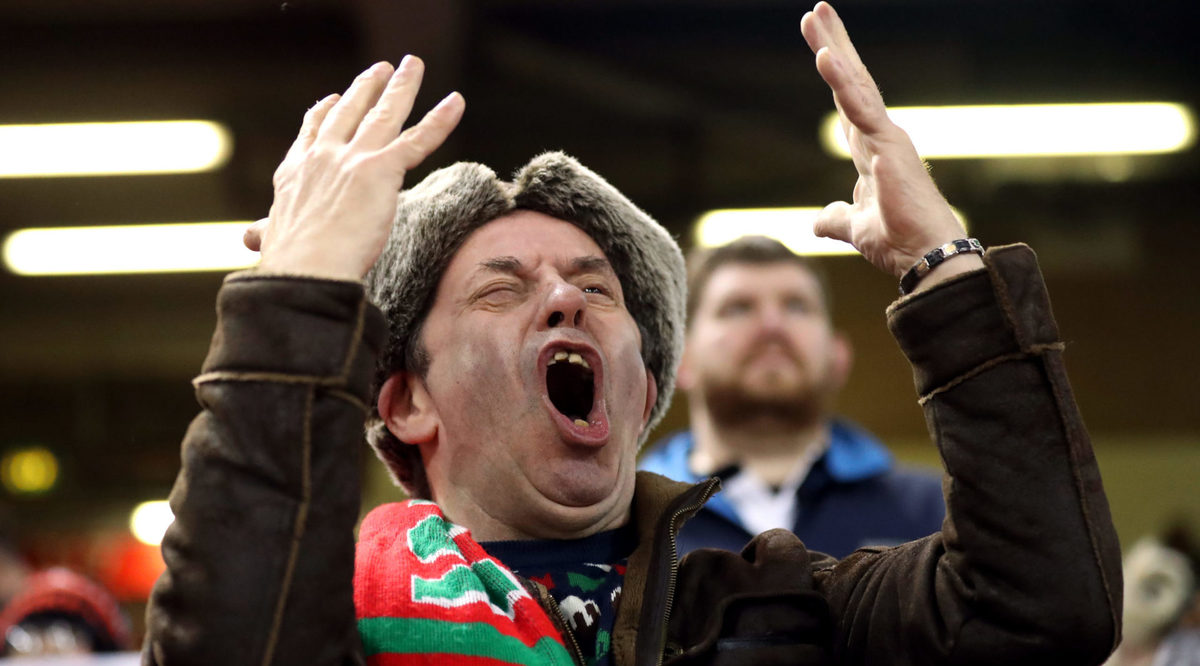Five things we learned from Pivac's first game in charge

Wayne Pivac got his stint as Wales coach off to a winning start and matchday captain Justin Tipuric asked Leigh Halfpenny to kick for the posts towards the end of the game, with Wales only seven points in front, suggesting that beginning in such a positive manner mattered to coaches and players.
It might have been an uncapped game against the Barbarians where the opposing coach – understandably – got the lion’s share of the adoration from the crowd, but there were still some key takeaways for Wales fans.
The future is bright
Taking over from Warren Gatland, Wales’ most successful coach of the professional era, after a 12-year reign, might be seen as the proverbial poisoned chalice for Pivac.
Continue reading below…
After all, expectations of fans are now much higher, both in terms of performances and results. But there was more than enough on show here to reassure Wales’ fans that their expectations might be met, with Pivac’s new charges working to stretch their opponent’s defence at every opportunity.

More than that, this team demonstrated how successful the previous regime was at establishing depth. Wales’ injury problems haven’t got much better, with Jonathan Davies, new man Willis Halaholo, and Rhys Patchell all being added to the long-term injury list in recent weeks. But Jarrod Evans gave a better account of himself at flyhalf than the last time he wore a Wales jersey, Tomos Williams looked like a starting scrumhalf, Aaron Wainwright suggested he has a future at an international standard No8 as well as a blindside, and Ollie Griffiths stepped up when Aaron Shingler went off injured. There is plenty for Pivac to work with.
Backs, meet the new forwards
It was a feature of Pivac’s Scarlets side that the forwards looked more than comfortable on the ball and, while Wales have been improving in that area for some time, this was a statement about the role the forwards will play going forward.

Wyn Jones’ gorgeous pass to set up Josh Adams’ second try will have opened the eyes of those who thought he was only selected for his scrummaging, while Ken Owens, Justin Tipuric, and Wainwright all regularly appeared in the wide channels, with Owens picking up his second try from there.
Of course, Alun-Wyn Jones has spent more time out wide of late, Cory Hill has soft hands, and, although, Jake Ball’s efforts have been heavily focused on the grunt work lately, anyone who has seen him in Scarlets colours will know he can make the final pass with the best of them. Add those second rows to the absent Taulupe Faletau, Rob Evans, and James Davies and then factor the work with the forwards it looks like Pivac has already done – it might not be the backs that have the crowd purring under the new regime.
Welsh talent ID in England is nothing new but with a new seam of gifted players plying their trade over the border, the battle to wear red or white shows no signs of letting up
– writes @OwainJTJones https://t.co/RF6PplTb9R
— RugbyPass (@RugbyPass) November 23, 2019
Josh Adams is the real deal
Speaking of the backs, there was also some talent on display there, led by the irrepressible Adams. Nobody tops the try-scoring charts at a Rugby World Cup without being a pretty handy player but he confirmed again that he is one of the best in the world. His brace here would have seen set a new record for Wales, had the game been capped.
This wasn’t the type of game to show his other strengths, like workrate in defence and ability in the air, but it confirmed that he is probably one of the first names on the team-sheet.
He wasn’t alone in impressing on the wing either, with Johnny McNicholl making an impressive first start for Wales. With serious pace, a fabulous range of passing, and total assuredness in defence, it seems likely we will see much more of McNicholl. Wales have George North and Liam Williams to come back into the squad, as well as the promising talents of Hallam Amos, Ashton Hewitt, and Owen Lane. The back three is looking tidy.
That's likely to be the first of many for Johnny McNichollpic.twitter.com/dmhFovrHGU
— RugbyPass (@RugbyPass) November 30, 2019
It’s a good thing Wales backrow options to spare
Wales’ depth across the back row is well-known. Even with Taulupe Faletau, Ellis Jenkins, and Josh Navidi injured, Pivac could afford to overlook James Davies and Ross Moriarty, while Dan Lydiate didn’t even get a call-up and Thomas Young was unavailable. That looks to be a good thing because Pivac’s Wales side, just like his previous teams, are going to be reliant on breakdown operators to generate quick ball and effect turnovers.
‘The players are all back next week and I’ll have to start selecting… back row is definitely somewhere we have genuine pressure’
– Dean Ryan tells @OwainJTJones about the welcome selection headaches he faces at unfancied @dragonsrugby https://t.co/3g11Efiux7— RugbyPass (@RugbyPass) November 29, 2019
It was noticeable how much Scarlets struggled in his last season, with most of the flankers injured, to implement their high-speed game. Wales’ impressive existing depth in this area, allied to the emergence of talent like Griffiths, Taine Basham, and Shane Lewis-Hughes, and the appointment of breakdown operator Sam Warburton to the backroom staff means it is considerably less likely to be an issue for Pivac’s Wales team.
Defence could be an area of concern
An uncapped match against the Barbarians is not exactly the time to show off one’s defensive credentials. That said, those who are used to Sean Edwards’ miserly “against” columns might have been a little surprised at the number of tries Wales leaked.
Wayne Pivac has been on a steep learning curve this week with Wales https://t.co/t8jvUWWw61
— RugbyPass (@RugbyPass) November 30, 2019
Balancing a free-wheeling, high-scoring attack with a rock-solid defence is the holy grail of rugby and it’s a target Pivac and defence coach Byron Hayward had some success with overseeing the Scarlets. International rugby is a different proposition, however, with far less time in camp and a higher calibre of opposition. It will be interesting to see if Wales can successfully add attacking flair without compromising the defence that was the bedrock of their success for 12 years.





























